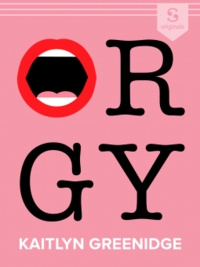
Published digitally on Scribd on July 23, 2021
“Orgy” is the first true “pandemic story” I’ve encountered. I’m sure many more are on the way, but “Orgy” is a short story and presumably made it to market more quickly than the pandemic novels we’ll soon see.
Nessa is “closer to forty than girlhood.” She lives in Brooklyn with her roommate Laurie, a writer who specializes in essays about the microaggressions displayed by white women who wear yoga pants. Nessa is fed up with social distancing, although she understands its necessity. It is nevertheless interfering with a sex life that was once active and varied.
Nessa is bisexual and, when she plays the game of looking at subway passengers and asking herself whether she would sleep with them, searches for ways to say yes. Yet Nessa’s regular booty-call partners aren’t risking contact with her during the pandemic, presumably because they regard her as a “third-tier friend — not worth the risk of sharing a restaurant meal with. It is a cold reckoning at the end of the world.”
Nessa receives an email inviting her to an orgy. She believes the email is from members of the furry community and that the orgy will be a costume party, so she dons her pig nose and tail, rips some holes in her leotards, and sets out into the night over her roommate’s objection that she’s breaching the lockdown. The orgy isn’t quite what she expects, in part because she receives an unexpected reaction to a story she likes to tell, a story that is “one of the foundational myths of herself.”
The desire to scratch an itch after a pandemic-induced dry spell is an interesting concept for a story, but the story’s greater interest lies in the impact of the pandemic on New Yorkers. Nessa has recently delivered groceries to a 15-year-old girl who refused to wear a mask and became ill with COVID. As she ponders the girl’s decision to make “a potentially dumb choice just to feel something like free,” she wonders if that is exactly what she is doing by attending an orgy. Yet “the pure glory of having a body and being alive” is something she has felt since she arrived in New York.
The story’s closing paragraphs suggest that Nessa doesn’t need an orgy to understand that sexual freedom is still essential to her sense of self. “Orgy” thus not only delivers insight into the protagonist butoffers a larger view of how the pandemic has collectively affected the lives of people who have taken it seriously and those who have not.
RECOMMENDED